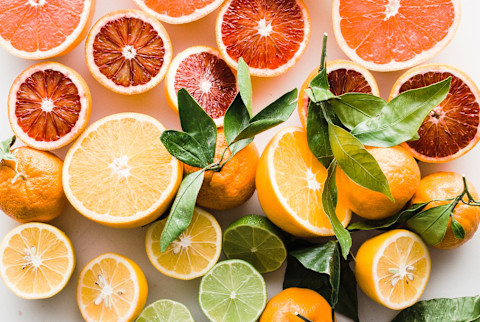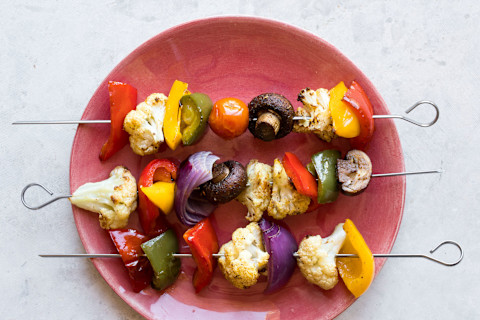Vitamin C: The Immune-Boosting, Skin-Supporting Nutrient You Should Be Getting Plenty Of

As we try to battle our way out of this year's cold and flu season, we often start looking to natural remedies that can help us survive or at least reduce the length of our sickness. Vitamin C is the granddaddy of immune-boosting vitamins. But that's not where its benefits end, either. Vitamin C is also praised as a go-to antioxidant that supports your body in myriad ways. So, is it legit or all hype? Let's break it down.
The health benefits of vitamin C.
Vitamin C is an essential micronutrient and acts as a potent antioxidant and cofactor for a good number of regulatory enzymes. It can help recruit immune cells and 1make reactive oxygen species with the ultimate goal of killing off bad bugs. A recent study demonstrated that vitamin C co-treatment2 is beneficial in reducing prenatal and postnatal lead-exposure-induced maldevelopment of cells in the brain.
Additionally, a study from 2015 suggested that high levels of vitamin C were able to kill human colon cancer cells3 that were cultured in the lab with two specific types of mutations (KRAS and BRAF) and that the therapeutic role of vitamin C in this setting should be considered further. Vitamin C may also have protective effects on influenza pneumonia4. In fact, it's not just influenza that vitamin C can help protect us against. An article in 2017 stated that 148 studies have been performed and showed that vitamin C could alleviate or prevent infections caused by bacteria, viruses, and protozoa. It may not necessarily decrease the incidence of getting colds, but at the same time it substantially decreased5 (by about half) the number of colds physically active people get.
Not only does vitamin C help with management of infections and colds; it may also potentially help in the management of depression. A very interesting study from last month demonstrated that in diabetes-induced rats who showed depression-like behavior, giving vitamin C6 helped with the depression, especially if blood sugar and insulin levels were also regulated.
Vitamin C, skin health, and longevity.
Getting old has been associated with an increase in oxidative damage, and some data supports the idea that eating a diet that is higher in antioxidants7, such as vitamin C, is associated with better health and longevity. Including foods rich in antioxidants such as vitamin C helps bolster the immune system8 and may play a role in modulation of chronic diseases, which become more prevalent as we age.
Another place vitamin C comes up often is with regards to skin care. There is some research to support that the effects of vitamin C can protect the skin9 in the setting of UVB-induced skin damage. We have also seen that a derivative of vitamin C, called DDH-1, can reduce the inflammatory response in skin and reduce psoriasis-like lesions10. A recent study even went so far as to suggest that vitamin C can prevent the natural aging process11 of the skin. It's no wonder that many of the skin and beauty products out there contain this powerful antioxidant.
Foods high in vitamin C.
This all sounds great, right? But how do we encourage our bodies to make more of this amazing nutrient? Well, that's the issue. Vitamin C cannot be made by humans; it has to be obtained from the diet. The concentrations of this powerful vitamin are dependent on how much is consumed, bioavailable, excreted by the kidneys, and used by the body12. So, in order to get some of the effects of this vitamin, you have to make sure you get enough in your regular daily diet and/or supplement regimen. In fact, a recent study from November 2018 showed that a higher dietary intake and/or blood concentration of vitamin C13 and other beneficial compounds (correlating to fruit and vegetable intake) was associated with reduced risk of heart disease, total cancer, and all causes of death.

By now you are probably wondering what foods you can eat more of to optimize your vitamin C levels. This powerful antioxidant is found in many different vegetables and fruits. One of the highest levels of vitamin C, coming in at a whopping 1,644 milligrams for 1 cup, is acerola, or West Indian cherry. Green peppers and red peppers, by comparison, contain about 120 to 190 milligrams of vitamin C per cup. The famous fresh-squeezed orange juice has about 124 milligrams per cup whereas one navel orange will get you about 83 milligrams of vitamin C. Don't forget strawberries and broccoli, which can get you just under 90 milligrams of vitamin C per cup. These are all great foods to incorporate into your daily and weekly routine to make sure you're getting a healthy daily dose of vitamin C.
Vitamin C dosing and safety.
The next topic that often comes up is, how much vitamin C can you take? It's good to know that when it comes to this nutrient, more does not necessarily mean better. Just as a frame of reference, we often develop problems like scurvy, swelling, fatigue, and depression when our intake of vitamin C falls below 10 milligrams per day, but toxicity can occur when we take more than 3,000 milligrams per day. In fact, the tolerable upper intake level for vitamin C in adults over age 19 is noted to be 2,000 milligrams. When you take too much vitamin C, some of the symptoms you may experience could include diarrhea, nausea, kidney stones, abdominal cramps, and pro-oxidant effects (as opposed to the beneficial antioxidant effects we get in healthy doses). In fact, some people use buffered vitamin C for the treatment of constipation because higher doses can be stimulating to the digestive system as a side effect.
A final word on vitamin C.
All in all, the important thing to remember is that vitamin C is a powerful ingredient in our efforts to maintain optimal health. Our human bodies don't make this vitamin, so we have to deliver it to our bodies for it to be able to help us. While you can take a vitamin or supplement that has vitamin C in it, remember that eating vegetables and fruits that are rich in vitamin C can be even better because not only do you get the vitamin C in the food, you also get the numerous other vitamins, minerals, phytonutrients, antioxidants, and fiber that comes along with it. For example, one of my favorite things to take during cold and flu season is elderberry. While it may not have the highest amount of vitamin C (although it does contain its fair share), it also is high in vitamin A, potassium, iron, B6, fiber, and beta-carotene.
So, if you want to try to keep the cold and flu at bay while giving your body, immune system, and skin some love, make sure you are getting enough daily vitamin C into your regimen. By eating plenty of vegetables and fruits, you will not only be making efforts to protect yourself against common infections, but you will also be doing a good service to your gut microbiome and digestive tract; they will thank you regularly for giving the wonderful gift of plants to your body. Acerola, anyone?
13 Sources
- https://www.ncbi.nlm.nih.gov/pubmed/29099763
- https://www.ncbi.nlm.nih.gov/pubmed/30488169
- https://www.ncbi.nlm.nih.gov/pubmed/26541605
- https://www.ncbi.nlm.nih.gov/pubmed/25710018
- https://www.ncbi.nlm.nih.gov/pubmed/28353648
- https://www.ncbi.nlm.nih.gov/pubmed/30399569
- https://www.ncbi.nlm.nih.gov/pubmed/24484938
- https://www.ncbi.nlm.nih.gov/pubmed/20666718
- https://www.ncbi.nlm.nih.gov/pubmed/30385817
- https://www.ncbi.nlm.nih.gov/pubmed/30503675
- https://www.ncbi.nlm.nih.gov/pubmed/30263780
- https://www.ncbi.nlm.nih.gov/pubmed/26808119
- https://www.ncbi.nlm.nih.gov/pubmed/30475962
